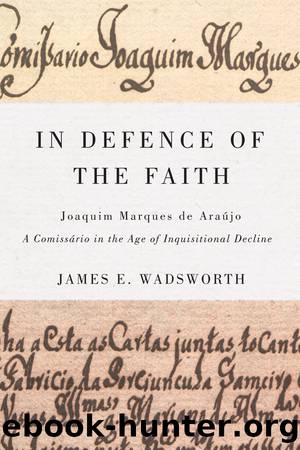In Defence of the Faith by Wadsworth James E.;

Author:Wadsworth, James E.;
Language: eng
Format: epub
Publisher: McGill-Queen's University Press
Published: 2013-08-15T00:00:00+00:00
Chapter 6
Suspended in the Agony of Decay
Joaquim Marques spent the last years of his career wallowing in the anguish of a comissário who had passed his prime and who struggled to sustain an institution equally past its prime. Nonetheless, he did not give up the struggle against Bernardo LuÃs or the rest of the libertines. Indeed, he expanded his front of attack, becoming ever more apocalyptic and frantic in his despair.
This despair coincided with the crisis of authority that rippled through the Portuguese and Spanish worlds following the French invasion of Spain and Portugal in 1808. Napoleon imprisoned the Spanish royal family, placing his brother on the throne, while the Portuguese court fled to Brazil escorted by British warships. Though few people recognized it, both Spanish and Portuguese America had embarked on the slow and painful road to political independence. For much of Spanish America, this meant years of bloody internecine warfare. For Brazil, it meant increased regional tension and ever-increasing British influence in Brazilian commerce and culture. Joaquim Marques linked this wave of British influence to the Frenchified libertines who tormented him. Together with these libertines, the threat of English Protestantism became a symbolic trope with which he fruitlessly sought to arouse the ire of the sluggish inquisitors in Lisbon.
After 1790, Joaquim Marques encountered increasing difficulty in completing the commissions sent to him. The French wars, enlightened thought, the Brazilian nativistsâ discontent with colonial status, population increase with its associated pressures on economic and social systems, and the inability of inquisitional office to provide the proofs of purity necessary for social promotion all converged after 1790 to complicate the performance of inquisitional business and to challenge the institutionâs very existence. As the prestige of the Inquisition diminished, so did the fear of it. People knew that sentences were often light and sometimes never carried out.
On 22 November 1803, Joaquim Marques wrote again to the Mesa with four denunciations against libertines. âIn these same denunciations we can see the miserable state in which this country finds itself, for there are so many libertines that almost every day [I receive] denunciations in diverse and scandalous matters. For this reason I have already represented to Your Excellencies to give speedy measures with respect to these facts. For the accusers demand some remedy to put an end to such lamentable havoc.â
He then reminded the inquisitors of the investigation he had sent them a year ago on Bernardo LuÃs and declared: â[D]espite my vigilance over these libertines, they continually conspire against me and grow to a greater degree in their libertinage believing perhaps that they will never be punished or that the punishment might be delayed.â1
Joaquim Marques was not the only one offended by Bernardo LuÃs and concerned with the attitudes he seemed to represent. In 1805, the Carmelite friar Miguel da Conceição complained that Bernardo LuÃs had a special friendship with a murderer from the interior. He claimed that Bernardo LuÃs consistently intervened with the local magistrate to get light sentences for those he defended as a lawyer and particularly for the murderer.
Download
This site does not store any files on its server. We only index and link to content provided by other sites. Please contact the content providers to delete copyright contents if any and email us, we'll remove relevant links or contents immediately.
Cat's cradle by Kurt Vonnegut(15334)
Pimp by Iceberg Slim(14488)
4 3 2 1: A Novel by Paul Auster(12375)
Underground: A Human History of the Worlds Beneath Our Feet by Will Hunt(12085)
The Radium Girls by Kate Moore(12018)
Wiseguy by Nicholas Pileggi(5769)
The Fire Next Time by James Baldwin(5431)
Perfect Rhythm by Jae(5398)
American History Stories, Volume III (Yesterday's Classics) by Pratt Mara L(5300)
Paper Towns by Green John(5177)
Pale Blue Dot by Carl Sagan(4996)
A Higher Loyalty: Truth, Lies, and Leadership by James Comey(4954)
The Mayflower and the Pilgrims' New World by Nathaniel Philbrick(4492)
The Doomsday Machine by Daniel Ellsberg(4484)
Killers of the Flower Moon: The Osage Murders and the Birth of the FBI by David Grann(4435)
The Sympathizer by Viet Thanh Nguyen(4384)
Too Much and Not the Mood by Durga Chew-Bose(4337)
The Borden Murders by Sarah Miller(4313)
Sticky Fingers by Joe Hagan(4188)
